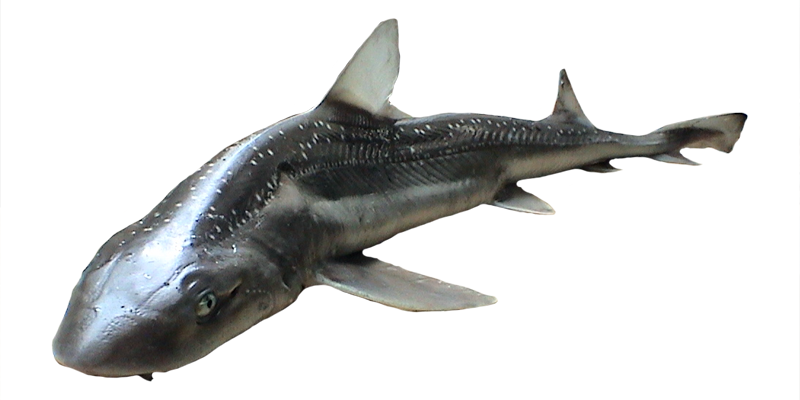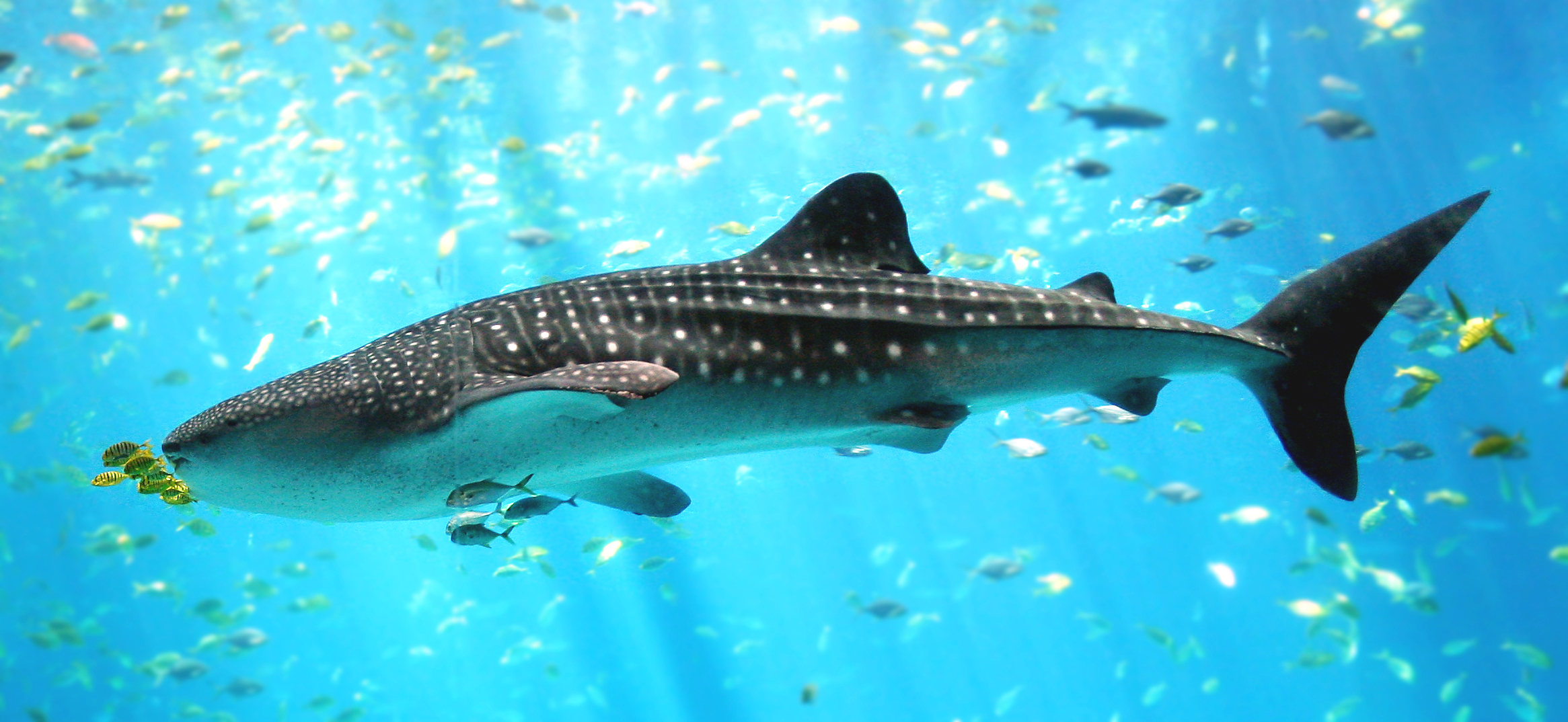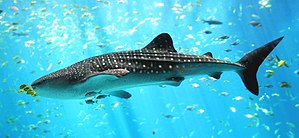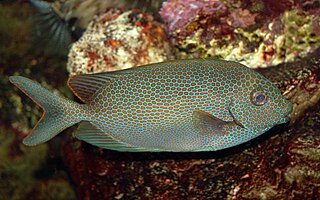Bathydemersal species
| Scientific name | Image |
|---|---|
| Heptranchias perlo, Sharpnose sevengill shark, (Hexanchidae) |  |
| Iago omanensis , Bigeye houndshark, (Triakidae) |  |
| Mustelus manazo , Starspotted smooth-hound, (Triakidae) |  |
There are 44 species of shark found in the Red Sea. [1] This list is not exhaustive.
| Scientific name | Image |
|---|---|
| Heptranchias perlo, Sharpnose sevengill shark, (Hexanchidae) |  |
| Iago omanensis , Bigeye houndshark, (Triakidae) |  |
| Mustelus manazo , Starspotted smooth-hound, (Triakidae) |  |
| Scientific name | Image |
|---|---|
| Rhizoprionodon acutus, Milk shark, (Carcharhinidae) |  |
| Scientific name | Image |
|---|---|
| Loxodon macrorhinus, Sliteye shark, (Carcharhinidae) |  |
| Hemipristis elongata, Snaggletooth shark, (Hemigaleidae) |  |
| Mustelus mosis, Arabian smooth-hound, (Triakidae) |
| Scientific name | Image |
|---|---|
| Alopias vulpinus, Common thresher, (Alopiidae) |  |
| Chaenogaleus macrostoma, Hooktooth shark, (Hemigaleidae) |  |
| Rhincodon typus, Whale shark, (Rhincodontidae) |  |



The hammerhead sharks are a group of sharks that form the family Sphyrnidae, so named for the unusual and distinctive structure of their heads, which are flattened and laterally extended into a "hammer" shape called a cephalofoil. Most hammerhead species are placed in the genus Sphyrna, while the winghead shark is placed in its own genus, Eusphyra. Many different, but not necessarily mutually exclusive, functions have been postulated for the cephalofoil, including sensory reception, manoeuvering, and prey manipulation. The cephalofoil gives the shark superior binocular vision and depth perception.

The tiger shark is a species of requiem shark and the only extant member of the genus Galeocerdo. It is a large macropredator, capable of attaining a length over 5 m. Populations are found in many tropical and temperate waters, especially around central Pacific islands. Its name derives from the dark stripes down its body, which resemble a tiger's pattern, but fade as the shark matures.

The oceanic whitetip shark, also known as Brown Milbert's sand bar shark, brown shark, lesser white shark, nigano shark, oceanic white-tipped whaler, and silvertip shark, is a large pelagic requiem shark inhabiting tropical and warm temperate seas. Its stocky body is most notable for its long, white-tipped, rounded fins.

The zebra shark is a species of carpet shark and the sole member of the family Stegostomatidae. It is found throughout the tropical Indo-Pacific, frequenting coral reefs and sandy flats to a depth of 62 m (203 ft). Adult zebra sharks are distinctive in appearance, with five longitudinal ridges on a cylindrical body, a low caudal fin comprising nearly half the total length, and usually a pattern of dark spots on a pale background. Young zebra sharks under 50–90 cm (20–35 in) long have a completely different pattern, consisting of light vertical stripes on a brown background, and lack the ridges. This species attains a length of 2.5 m (8.2 ft).

The wobbegong is the common name given to the 12 species of carpet sharks in the family Orectolobidae. They are found in shallow temperate and tropical waters of the western Pacific Ocean and eastern Indian Ocean, chiefly around Australia and Indonesia, although one species occurs as far north as Japan. The word wobbegong is believed to come from an Australian Aboriginal language, meaning "shaggy beard", referring to the growths around the mouth of the shark of the western Pacific.

The spiny dogfish, spurdog, mud shark or piked dogfish, is one of the best known species of the Squalidae (dogfish) family of sharks, which is part of the Squaliformes order. While these common names may apply to several species, Squalus acanthias is distinguished by two spines and no anal fin. It lives in shallow waters and further offshore in most parts of the world, especially in temperate waters. Those in the northern Pacific Ocean were reevaluated in 2010 and found to constitute a separate species, now called the Pacific spiny dogfish .

The school shark is a houndshark of the family Triakidae, and the only member of the genus Galeorhinus. Common names also include tope shark, snapper shark, and soupfin shark. It is found worldwide in temperate seas at depths down to about 800 m (2,600 ft). It can grow to nearly 2 m long. It feeds both in midwater and near the seabed, and its reproduction is ovoviviparous. This shark is caught in fisheries for its flesh, its fins, and its liver, which has a very high vitamin A content. The IUCN has classified this species as critically endangered in its Red List of Threatened Species.

The gummy shark, also known as the Australian smooth hound, flake, sweet william or smooth dog-shark, is a shark in the family Triakidae. These small to medium-sized bottom-dwelling sharks are found mostly in, but are not limited to, the area around the southern seas of Australia and is commonly baited and fished for cuisine because of its taste and market prices. According to a 2021 paper by White, Arunrugstichai & Naylorn (2021), Mustelus walkeri is the same animal as M. antarcticus. One theory is that M. walkeri is a subpopulation of M. antarcticus.

The silvertip shark is a large species of requiem shark, in the family Carcharhinidae, with a fragmented distribution throughout the tropical Indian and Pacific Oceans. It is often encountered around offshore islands and coral reefs, and has been known to dive to a depth of 800 m (2,600 ft). The silvertip shark resembles a larger and bulkier grey reef shark, but can be easily identified by the prominent white margins on its fins. It attains a maximum length of 3 m (10 ft).

The whitecheek shark or widemouth blackspot shark is a requiem shark of the family Carcharhinidae, found in the Indo-West Pacific Ocean between latitudes 34°N and 25°S. It can reach a length of 1 m. It feeds mainly on fish, cephalopods, and crustaceans. It is a viviparous species, with the female giving birth to up to four live young.

The spot-tail shark, or sorrah shark, is a species of requiem shark, in the family Carcharhinidae, found in the tropical Indo-West Pacific Ocean between latitudes 31°N and 31°S, from the surface to a depth around 72 m (236 ft). This shark grows to about 1.6 m. It is fished commercially over much of its range and the IUCN considers it to be near threatened.

The starry smooth-hound is a houndshark of the family Triakidae. It is found on the continental shelves of the northeast Atlantic, between latitudes 61° N and 16° N, from the surface to a depth of 200 m (660 ft). It can grow up to a length of 1.4 m.

The great lanternshark is a shark of the family Etmopteridae found in the northeast and northwest Atlantic. Its name was given as at the time of its discovery, it was thought to be bioluminescent, but this has been challenged.

The blackmouth lanternshark is a shark of the family Etmopteridae found off Western Australia and the Arafura Sea, at depths between 430 and 550 m. Its length is up to 26 cm.

The grey bamboo shark, Chiloscyllium griseum, is a species of carpet shark in the family Hemiscylliidae, found in the Indo-West Pacific Oceans from the Arabian Sea to Pakistan, India, Malaysia, Thailand, Indonesia, China, Japan, the Philippines, and Papua New Guinea, between latitudes 34° N and 10° S, and longitude 60° E and 150° E. Its length is up to 74 cm.

The following outline is provided as an overview of and topical guide to sharks:

Coral reef fish are fish which live amongst or in close relation to coral reefs. Coral reefs form complex ecosystems with tremendous biodiversity. Among the myriad inhabitants, the fish stand out as colourful and interesting to watch. Hundreds of species can exist in a small area of a healthy reef, many of them hidden or well camouflaged. Reef fish have developed many ingenious specialisations adapted to survival on the reefs.

Saltwater fish, also called marine fish, are fish that live in ocean water. Saltwater fish can swim and live alone or in a large group called a school.
FishBase. Ed. Ranier Froese and Daniel Pauly